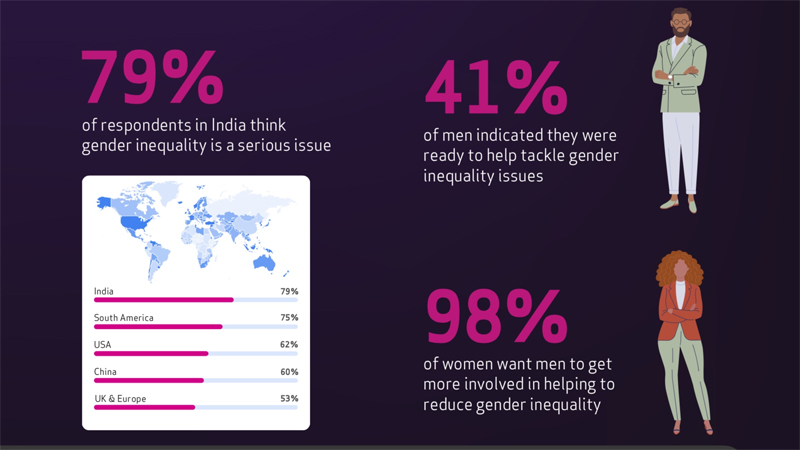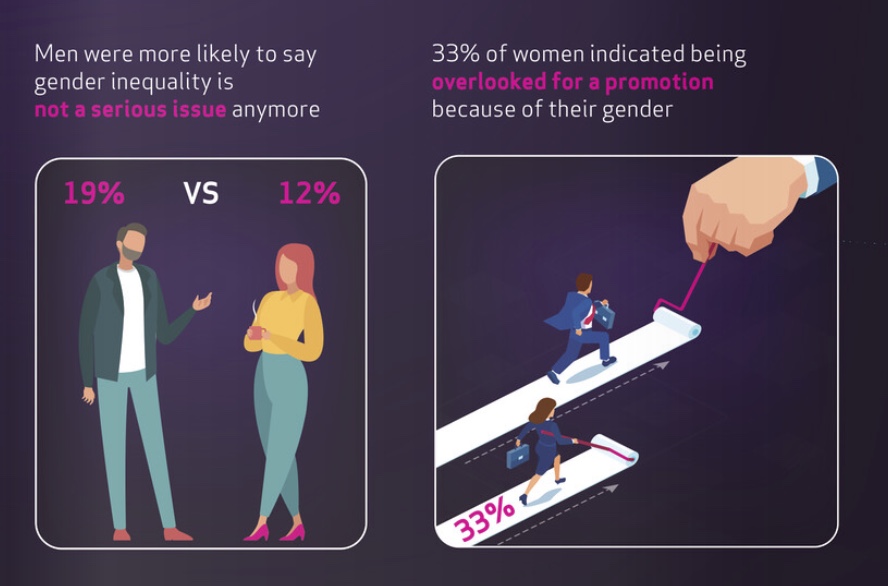New global research has revealed that most men are still ‘unsure’ of how to be an ally and support gender equality.
The research carried out by marketing agency LEWIS, in support of the global HeForShe movement, found that although an alarming 98% of women want men to help them address gender inequality issues, fewer than half actually know how to. In fact, the Progressing Gender Equality report indicated that only 41% of men were ready to tackle gender inequality issues.
More respondents in India (79%) and South America (75%) said that gender inequality is a serious issue, compared to those based in the UK and Europe (53%). Acknowledging the problem isn’t enough, according to the women surveyed across 13 countries. They want active support from male allies to combat inequality. Nearly four in 10 (39%) women said men should speak out against gender inequality when they witness it. And one third (33%) want men to take on more household duties.

COVID-19 IMPACT ON WOMEN
The disproportionate impact of Covid-19 on women is abundantly clear, noted the study. Not only has it caused more stress for women, but it has created more job insecurity (as reported); and has resulted in fewer benefits, as well as potential financial losses. According to the survey, women have suffered from:
- More stress: 24% of women reported they were required to take on new duties as part of their job compared to 22% of men. Women also indicated seeing a greater increase in their housework and childcare responsibilities compared to their male counterparts.
- Fewer benefits: Male employees said they saw more opportunities for financial raises (13%) than did female employees (11%); and over a quarter of women said they have been overlooked for a promotion because they have children, compared to 16% of men.
- Job insecurity: 14% of women reported being furloughed during the pandemic compared to 11% of men; exacerbating an already significant gap between employment and economic opportunities between male and female counterparts.
ADDRESSING WORKPLACE INEQUALITY
Businesses also need to address the stark contrast between how gender inequalities are perceived in the workplace. Areas that need addressing include:
- Lack of awareness: Male employees were more than twice as likely as female colleagues to say that gender inequality is no longer an issue facing women.
- Speaking out: Nearly half of women say they want men to speak out against gender inequality when they witness it; and to listen more to female colleagues about the issue, while only 28% of men reported feeling the same.
- Parenting matters: Parents of daughters are more engaged in the issue than parents of sons. Additionally, 26% are more likely to discuss gender inequality issues at work; and 30% are more likely to discuss gender inequality issues at home.

ADDRESSING SYSTEMIC GENDER INEQUALITIES
Yvonne van Bokhoven, Executive Vice President at LEWIS, believes that this research is a “powerful reminder” that the advances made to combat gender inequality and discrimination “can be easily lost if we are not careful”. “We need everyone, men and women, to take steps now to empower women by speaking up, being allies; and working to address systemic gender inequalities,” she stated.
Edward Wageni, Global Head of HeForShe, agrees: “What this research emphasises is the need to take action now more than ever. Covid-19 has only exacerbated gender inequalities across the globe; and we each have a role to play to ensure that not only do we build back better; but we also build back equal.”
HOW MALE ALLIES CAN HELP
“You don’t need to personally be a victim of discrimination to understand why we need to fight it,” added Chris Lewis, CEO of LEWIS. “It’s clear that men can – and should – do more to help. Our hope is this research will help shine a light on the challenges women face to make all of us stronger allies in the fight against inequality.”
So how exactly can men help to address inequality both at home and work? The report suggests the following steps:
- Speak out against gender inequality when you witness it.
- Take on more ‘traditional’ female roles in the household, such as cleaning, cooking, childcare etc.
- Actively participate in conversations about gender inequality.
- Promote rules/laws against gender inequality.
- Help educate others about gender inequality.
To read the full report, click here.







































